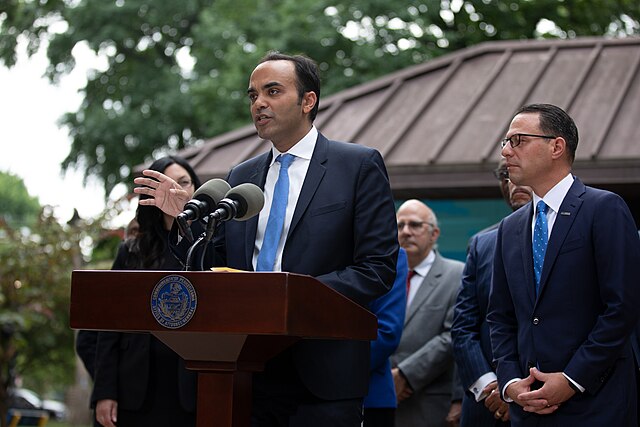Under Director Rohit Chopra, the Consumer Financial Protection Bureau has facilitated a resurgence in consumer relief won through enforcement actions relative to the Trump years, which were marked by lax enforcement (see the chart below from the CFPB). This increase in relief came amidst industry-driven challenges to the agency’s constitutionality. The case stifled some potential action, but the agency’s enforcement actions have rebounded since the Supreme Court rejected the challenges to its existence.
A selection of notable CFPB enforcement actions:
- Ordered Wells Fargo to pay $2 billion to consumers and a $1.7 billion civil money penalty for “widespread mismanagement” across a number of areas, including the illegal repossession of peoples’ cars, wrongful foreclosure on some borrowers’ homes, and usage of a flawed automated system to freeze over one million consumer accounts.
- Reached a $2.7 billion settlement with credit repair companies who illegally used telemarketing to offer consumers an improvement to their credit in exchange for an upfront fee. Companies are required to accurately demonstrate that they achieved their promised results on consumers’ credit at least six months prior to asking for payment. As the CFPB has warned, credit repair companies are mostly scams.
- Ordered Bank of America to pay $100 million to consumers and $150 million in penalties ($90 million to the CFPB and $60 million to the Office of the Comptroller of the Currency) for:
- Charging customers a $35 overdraft fee even when the bank declined a transaction that exceeded customers’ available account balance — often charging the fee multiple times on the same transaction
- Preventing consumers from using rewards the bank promised them
- Opening fake credit card accounts under consumers’ name without their consent
- Fined Bank of America $100 million (in addition to the OCC fining it $125 million) for freezing people’s bank accounts with a bad fraud detection system and making it exceedingly difficult to unfreeze them, resulting in many having their unemployment insurance benefits frozen at the height of the pandemic, when unemployment was still in the double digits.
- The CFPB also ordered U.S. Bank to pay $21 million for similarly freezing peoples’ bank accounts and thus blocking access to unemployment benefits during the pandemic
- Ordered Regions Bank to pay $191 million—$141 million of which went directly to harmed consumers—for illegally and knowingly charging overdraft fees even as it showed consumers that they had enough money in their account for a given transaction.
- Ordered Citi to pay nearly $26 million in fines for discriminating against Armenian Americans.
- Obtained a $9 million civil money penalty from Citizens Bank for “failing to properly manage and respond to customers’ credit card disputes and fraud claims.”
- Ordered Apple and Goldman Sachs to pay $89 million for numerous failures in the Apple Card’s dispute system. The CFPB also banned Goldman Sachs from creating any new credit cards “unless it can provide a credible plan that the product will actually comply with the law.”
- Ordered TD Bank to pay nearly $28 million for failing to fix systemic issues that put false information on people’s credit reports.
- Ordered Toyota Motor Credit, the lending arm of Toyota, to pay $60 million, including $48 million to compensate harmed consumers, for a range of illegal behaviors, including running a hotline that primarily served to stop customers from canceling their products. Per the CFPB, “Representatives on the hotline were instructed to keep promoting the products until a consumer had verbally requested to cancel three times, at which point the representatives would tell the consumer that it was only possible to cancel by submitting a written request.”
The CFPB has also used its rulemaking and guidance powers to shield consumers from financial abuses. A selection of notable rulemakings and guidance:
- Proposed and finalized an “open banking” rule, which makes it much easier for consumers to switch banks and financial institutions, allowing people to obtain better interest rates on their savings with fewer barriers, among other benefits.
- Corporate pushback: On the same day that the rule was finalized, banking groups filed a lawsuit to prevent it from ever coming into effect.
- Proposed and finalized a rule creating a registry of nonbank financial institutions that repeatedly violate consumer protection laws, finally acting on authority given to the CFPB in 2010 by Congress. The first registration submission period went live on October 16, 2024.
- Proposed and finalized a rule lowering credit card late fees, bringing the typical fee from $32 down to $8. The CFPB estimates this rule will save American families $10 billion out of the $14 billion in late fees charged to consumers annually.
- Corporate pushback: The rule—and its associated savings for consumers—is currently being challenged by the Chamber of Commerce and other business groups in the right-wing Fifth Circuit. The Fifth Circuit previously ruled that the CFPB’s funding structure is unconstitutional, a decision which the Supreme Court later reversed.
- Proposed and finalized a rule that will require creditors to report a range of data on loans to small businesses—an area where there is currently no overarching data—allowing the agency to more fully understand the industry and, in particular, crack down on potential discrimination.
- Proposed a rule banning medical bills from credit reports, which would disallow creditors from using medical information in determining creditworthiness. As Chopra noted in the announcement, “Medical bills on credit reports too often are inaccurate and have little to no predictive value when it comes to repaying other loans.”
- Issued ethics guidance seeking to limit “revolving door misconduct,” wherein former regulators go to work for the private entities they were charged with regulating, and use their contacts from their time as a regulator to lobby for the interests of the regulated.
Click here to see all 45 rules finalized by the CFPB since Director Rohit Chopra was sworn in.
Image: As a work of the U.S. federal government, the image is in the public domain (17 U.S.C. § 101 and 105).

